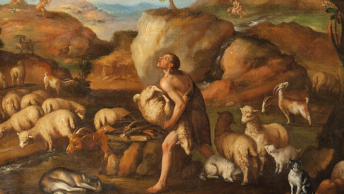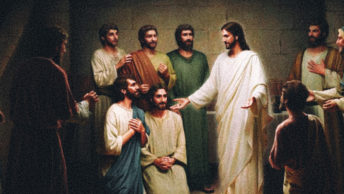There was once a great musician and composer who had a rebellious teenage son. When the boy was angry with his father, he would bide his time until his parents had gone upstairs to bed for the night, and then go to his father’s piano and loudly play a single scale, but always leave out the final note: DOE-RAY-ME-FA-SEW-LA-TEA, and stop right there. Then, with a mischievous smile, he would go upstairs to his own room, knowing his musical father had heard him and was going crazy over the unfinished scale. The composer needed to have everything balanced and complete and in harmony, and so he was unable to relax and fall asleep until he himself finally went downstairs to the piano and played the final note; only then could he go back up to his bed and fall asleep (Gordon MacDonald, Restoring Your Spiritual Passion, homily notebook, “Rest”).
Worry, stress, and discontent over the way things are keep a lot of people up at night—so much so that some experts believe Americans have a national “sleep deficit.” In one survey, over half of all workers admitted to falling asleep on the job—and this can lead to serious and deadly consequences. For instance, the accident at the Three Mile Island nuclear power plant in Pennsylvania back in 1979, and the 1986 meltdown at the Russian nuclear plant in Chernobyl, both occurred in the early hours of the morning, when workers were at a physical and mental low point. Drivers falling asleep at the wheel can cause traffic accidents; some years ago a young priest here in the Archdiocese of Detroit died in this manner. Even apart from tragic instances, few of us would claim to be at our best, or to operate at peak efficiency, when we’re tired. Many famous people, such as Albert Einstein and Winston Churchill, strongly believed in the benefit of a daily nap. Most of us can easily recognize when we’re physically rundown and would benefit from taking some quiet time to rest and recharge ourselves; we also need to do the same thing regularly in a spiritual sense. God did not create us to be busy all the time—and so, if we truly wish to know Him, we must learn how to be quiet and still in His presence.
We see in the Gospel of Mark (6:30-34) that being with Jesus, as the apostles were, was like being in the eye of a hurricane: noise, activity, and commotion all around. Our Lord knew the apostles could only continue their ministry for so long, and therefore called them to rest. When this proved impossible because a vast crowd was waiting at what they thought would be a deserted place, Jesus took charge and began teaching the people—presumably while sending the apostles somewhere else to find a quiet place and relax a little while. When we’re overwhelmed by life’s demands, the Lord invites us to turn to Him and let Him take over for the time being. The prophet Jeremiah (23:1-6) speaks of how God shepherds His people, and St. Paul (Eph 2:13-18) tells us that Christ is our peace—and this means we can afford to let go of our worries each night and entrust them into the Lord’s hands, taking time to rest so that we might continue to serve by fulfilling our duties the next day.
Someone once said that the three words which best define our busy society are “worry, hurry, and bury”—in other words, so many people are at risk of stressing and overworking themselves into an early grave. This is a tragedy; however, it’s an even greater tragedy if we’re so busy with worldly things that we never take the time we need for our souls, and thus die spiritually unprepared for our encounter with God. Every single one of us will one day leave this world and enter into eternity, and it’s our duty to be ready for this moment. No one can relieve us of this responsibility, but Jesus stands ready to help us fulfill it. I think this is true in three ways in particular.
First of all, it’s highly beneficial to have an occasional retreat or day of recollection, a break in our regular routine which allows us to slow down and become more aware of God’s presence. Making time for this is like a vacation for our souls, an opportunity to appreciate all the blessings we’ve received, to think about our spiritual goals in life, and to reflect on what we need to do in order to come closer to the Lord. Many people find the structure offered at a retreat center very helpful in this regard, but this sort of spiritual oasis can also be found out in nature, in a setting we find peaceful and relaxing. This is a wonderful opportunity for praying, reading the Bible or other spiritual books, and writing our thoughts in a journal; all these things can help us find our spiritual bearings.
Secondly, every Sunday is supposed to be a day of rest and a day we make holy; we do this by attending Mass, by avoiding all unnecessary work, and, if possible, by sharing and enjoying time with family and friends. The Third Commandment—keep holy the Sabbath—isn’t for God’s sake, but for our own; as Catholics, we need the weekly spiritual nourishment offered here at Mass in Scripture, shared prayer, and the Eucharist. As the first day of the week, Sunday sets the tone for all the days that follow; if we make time for the Lord on the day set aside to honor Him, we can be sure He will “make time”to help us, guide us, strengthen us, protect us, and bless us the rest of the week.
Thirdly, Jesus wants us to spend time with Him every single day. It’s foolish to begin our daily activities without taking at least a few minutes to ask for His guidance and assistance, and it’s short-sighted to omit talking to Him at the end of the day, when we can thank Him for the blessings it held and ask His forgiveness for that day’s sins and omissions on our part. Our time on earth is not unlimited, and in order not to waste it, we should spend part of each and every twenty-four hour period with the Lord in prayer.
Not everyone, of course, has the luxury of carving out thirty minutes or an hour just for prayer, but everyone can, at the very least, pray while getting dressed, driving to work, or performing daily chores and various activities, even if for only a few minutes. Memorized prayers are good, but it can often be more helpful, and easier, just to talk to the Lord directly from our hearts—and not necessarily about “holy” or religious things, but about our worries, hopes, fears, and the simple routine things happening in our lives.
When we meet Jesus face-to-face on the day we die, we won’t want Him to be a stranger—and that means getting to know Him now. Only if we’re willing to make room for Him in our earthly lives can we be sure of having a place with Him in Heaven.








